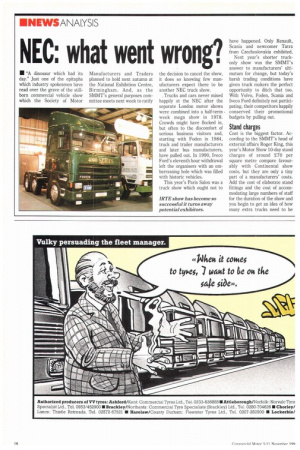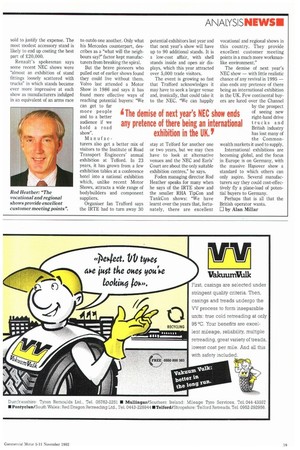NEC: what went wron
Page 20

Page 21

If you've noticed an error in this article please click here to report it so we can fix it.
• "A dinosaur which had its day," Just one of the epitaphs which industry spokesmen have read over the grave of the stillborn commercial vehicle show which the Society of Motor Manufacturers and Traders planned to hold next autumn at the National Exhibition Centre, Birmingham. And, as the SMMT's general purposes committee meets next week to ratify the decision to cancel the show, it does so knowing few manufacturers expect there to be another NEC truck show.
. Trucks and cars never mixed happily at the NEC after the separate London motor shows were combined into a half-term week mega show in 1978. Crowds might have flocked in, but often to the discomfort of serious business visitors and, starting with Foden in 1984, truck and trailer manufacturers and later bus manufacturers, have pulled out. In 1990, Iveco Ford's eleventh hour withdrawal left the organisers with an embarrassing hole which was filled with historic vehicles.
This year's Paris Salon was a truck show which ought not to have happened. Only Renault, Scania and newcomer Tatra from Czechoslovakia exhibited.
Next year's shorter truckonly show was the SMMT's answer to manufacturers' ultimatum for change, but today's harsh trading conditions have given truck makers the perfect opportunity to ditch that too. With Volvo, Foden, Scania and Iveco Ford definitely not participating, their competitors happily conserved their promotional budgets by pulling out.
Stand charges Cost is the biggest factor. According to the SMMT's head of external affairs Roger King, this year's Motor Show 10-day stand charges of around 70 per square metre compare favourably with Continental show costs, but they are only a tiny part of a manufacturers' costs. Add the cost of elaborate stand fittings and the cost of accommodating large numbers of staff for the duration of the show and you begin to get an idea of how many extra trucks need to be
sold to justify the expense. The most modest accessory stand is likely to end up costing the best part of £20,000.
Renault's spokesman says some recent NEC shows were "almost an exhibition of stand fittings loosely scattered with trucks" in which stands became ever more impressive at each show as manufacturers indulged in an equivalent of an arms race to outdo one another. Only what his Mercedes counterpart, describes as a "what will the neighbours say?" factor kept manufacturers from breaking the spiral.
But the brave pioneers who pulled out of earlier shows found they could live without them. Volvo last attended a Motor Show in 1986 and says it has found more effective ways of reaching potential buyers: "We can get to far more people and to a better audience if we hold a road show".
Manufacturers also get a better mix of visitors to the Institute of Road Transport Engineers' annual exhibition at Telford. In 23 years, it has grown from a few exhibition tables at a conference hotel into a national exhibition which, unlike recent Motor Shows, attracts a wide range of bodybuilders and component suppliers.
Organiser Ian Trafford says the IRTE had to turn away 30 potential exhibitors last year and that next year's show will have up to 90 additional stands. It is a low-cost affair, with shell stands inside and open air displays, which this year attracted over 5,000 trade visitors.
The event is growing so fast that Trafford acknowledges it may have to seek a larger venue and, ironically, that could take it to the NEC. "We can happily stay at Telford for another one or two years, but we may then have to look at alternative venues and the NEC and Earls' Court are about the only suitable exhibition centres," he says.
Foden managing director Rod Heather speaks for many when he says of the IRTE show and the smaller RHA TipCon and TankCon shows: "We have learnt over the years that, fortunately, there are excellent vocational and regional shows in this country. They provide excellent customer meeting points in a much more workmanlike environment."
The demise of next year's NEC show — with little realistic chance of any revival in 1995 — also ends any pretence of there being an international exhibition in the UK. Few continental buyers are lured over the Channel by the prospect of seeing new right-hand drive trucks and British industry has lost many of the Commonwealth markets it used to supply.
International exhibitions are becoming global, and the focus in Europe is on Germany, with the massive Ha,nover show a standard to which others can only aspire. Several manufacturers say they could cost-effectively fly a plane-load of potential buyers to Germany.
Perhaps that is all that the British operator wants.
El by Alan Millar












































































